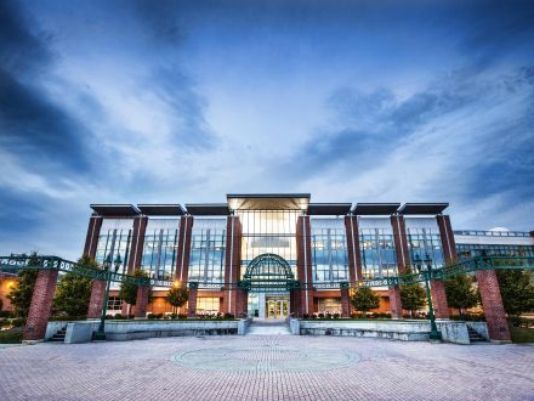Throughout our conversations with the faculty and students at Geneseo, our interviewees were certain that liberal arts institutions are unique environments; this uniqueness, it seems to us, is a result of an educational agenda that seeks to prepare students to be workers while simultaneously emphasizing understanding the complications of what it means to be a human in our world. Yet, this belief is probably true of most liberal arts institutions—institutions that believe in the value of understanding diversity and of engaging with societal issues in a logical and educated manner. So what makes Geneseo’s environment special?
According to some, like Katherine Zaslavsky, a senior at Geneseo who will graduate in the spring of 2017, Geneseo is special because of its academic flexibility: “I only looked at colleges where I could change my major [so] I needed to pick a place that was pretty good at everything.” Indeed, every person we interviewed noted in some fashion the importance of Geneseo’s capacity for flexibility and diverse strengths. Joanna Kirk, professor of Sociology and Political Science, told us that liberal arts colleges are unique because they are perfect for people who are “jacks of all trades” with regard to their educational background. Professor Kirk’s background is in the humanities and law, and she worked “overseas in development and democratization” before coming to Geneseo. “I think someone like me,” professor Kirk explained, “has a place in the liberal arts alongside those experts who are niched in.”
Even the experts—like professor of American history Justin Behrend—get out of their comfort zone and teach courses for students outside of their major. Professor Behrend explained that 70% of the history department’s course offerings fulfill general education requirements; many history courses count towards requirements in social sciences, American history, and multicultural civilizations—which means that history professors aren’t always working with students who are particularly invested in studying history. And history professors frequently teach gen-eds outside the history department, like humanities and INTD-105, the freshmen writing course. “I think it [liberal arts] is a great way to do higher education,” said professor Behrend, “it’s a way to get to know students and have faculty student interaction.” Professor Behrend went on to compliment the quality and complexity of student work, as well as the quality of students at liberal arts colleges, and remarked projects like this one are special to the liberal arts and are “selling points” for the college.
Professor of music Brooke McCorkle, who has degrees in international studies, Japanese, and musicology, said that she was particularly attracted to liberal arts institutions because of her “diverse educational background.” In specific reference to Geneseo as a unique liberal arts institution, professor McCorkle explained that “one of the things […] I appreciate the most about Geneseo is the freedom to teach what I want and [to teach] my interests.” Professor McCorkle teaches courses in music and freshmen writing, and in the past three semesters has developed eight new courses at Geneseo. While teaching a new course is a laborious endeavor—and the professors we interviewed attested to this—Professor McCorkle has “managed to stay active as a researcher” because the freedom Geneseo gives her allows her to coincide her teaching interests with her research interests. These qualities—flexibility and freedom to teach what you want, diverse strengths, the potential to take courses in a variety of disciplines and subjects—are qualities that are not only unique to liberal arts, but in fact rise out of the structure of a liberal arts education.
According to Ken Asher, Professor of English and Philosophy and the Director of Humanities, the universities’ liberal arts requirements often spark interests students never knew they had—and this can culminate in a student adopting a major they never considered. In fact, some departments at Geneseo depend on the liberal arts requirements sending students their way: in an administrative conversation that weighed the possibility of reducing the humanities sequence to one course, the geology department resisted. It was likely that reducing the humanities sequence meant reducing other liberal arts requirements—such as lowering the two natural science requirements to one. As a small major, the geology department was worried that many students don’t come to Geneseo with the plan to major in Geology; instead, students take a course in geology as a general education requirement and decide that they really enjoy it. I can see how this happens—last year I took “The Geology of Climate Change” with Professor Scott Giorgis and it was hands down one of the best classes I’ve taken at Geneseo, and my friends in the class agreed. With only two semesters left, it wasn’t enough to make me change my major, but if I had taken the class as a freshman, things may have gone differently.
While these freedoms are enjoyed by most students and faculty who pass through Geneseo, they must be closely observed in order to maintain cohesion and homeostasis across the various academic departments. In our interview with Professor Asher, he explained that because the different departments are so interconnected by the liberal arts requirements, lessening any requirement could cause a “whole department [to] shrink or evaporate.” Regarding the geology department’s resistance to potentially reducing the humanities requirements, Professor Asher commented, “any time you change something, there are so many moving parts nobody can envision.” But even this issue reinforces the importance of a liberal arts education, namely, understanding interconnectedness, common values, and different perspectives. That administrators agreed that reducing the humanities could harm the geology department signifies a whole-hearted embrace of what Professor Kirk explained to be at the heart of liberal arts: creating citizens “who know how different minds work and who have the capacity to cross those boundaries.” Without these people, she added, “I think there’s a tendency to just box in.”
